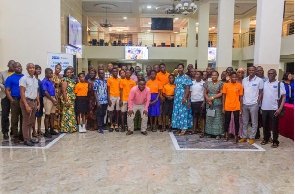A total of 1,018 teenage pregnancies were recorded in Eastern Region in 2020.
The region was ranked the second with the highest number of teenage pregnancies after the Ashanti Region during the period.
According to the 2021 Population and Housing Census, 79,733 girls in Ghana aged 12 to 17 have been married or cohabitating with a man.
Out of the number, 25,999 are girls aged 12 to 14 years.
The education of these girls is often truncated.
The phenomenon is common at Timber Nkwanta and Konko communities in Akuapem North Municipality in the Eastern Region.
Ankobeahene Bekoe is worried that despite banning teenagers and children from wake-keeping ceremonies, the teenage pregnancy menace continues to increase.
Starr News Eastern Regional Correspondent Kojo Ansah encountered many teenage mothers during a visit to the communities on April 1, 2023.
Sadly, some of the victims have been betrothed and cohabitating with their perpetrators.
Mawusi, one of the victims at Timber Nkwanta, a farming community says, she was impregnated almost two years ago when in JHS 2 by a 36-year-old man.
“I was in form two when I got pregnant. After delivery, I came back so I am in form 3. I had sex with a man and got pregnant. I blame my father because he failed to take care of me so it is my mother who was trying but couldn’t provide me with my needs because she said she doesn’t have money so sometimes I have to go to people's farms to labour to get money to buy food,” she told Starr News.
Mawusi’s mother betrothed her to cohabitate with the man after she became pregnant.
After delivery, she is back to school with the expectation to take part in this year’s Basic Education Certificate Examination (BECE).
She says her presumptive husband, a farmer, does not have money to take care of her and the baby, therefore, she is compelled to engage in farm labour to take care of herself and the baby.
Combining this with childcare and education, Akua says it has not been easy but she is persevering to enable her to pursue her dream of becoming a fashion designer.
“I want to be a fashion designer. My 'husband' sometimes doesn’t have money to take care of myself and the baby so I go to the farm to do labourer work to get money to feed the family. I carry cassava or orange for traders to get money. It is not easy combining learning, childcare and farm labour but I am trying my best. I need help from NGOs too to help me further my education to become a fashion designer. What happened was a mistake and won’t happen again,” she lamented.
Ama, one of such teenage girls at Konko, also got impregnated after BECE in 2022.
Ama was however reticent to give information about the perpetrator who impregnated her and whether or not she has been betrothed.
She said she will like to continue her education and will welcome any support for her to realize her intention.
To address these challenges, Plan International Ghana has mobilized stakeholders including Commission on Human Rights and Administrative Justice (CHRAJ), the Domestic Violence and Victims Support Unit(DOVVSU), Ghana Education Service (GES), Ghana Health Service (GHS), community leaders, among others to implement phase II of an intervention dubbed “Be Smart, Learn and Stay in School Project” to deal with the menace and other forms of gender-based violence in selected communities in Jasikan in Oti Region, Upper Manya Krobo districts and Akuapem North Municipality in Eastern region.
The first phase of the project achieved its target as teenage pregnancy cases significantly reduced in the three districts while awareness creation led to a rise in reporting of gender-based violence among teenage girls in particular.
The project led to capacity building and provision of logistical support to stakeholder institutions and also enhanced collaboration and coordination among them and the Communities.
Daniel Tei, a Public Health Nurse and George Adzovie of CHRAJ in the Upper Manya Krobo district corroborated the positive impact of the project on institutional capacity and effectiveness.
Speaking to Starr News on the sideline of the workshop and launching of Phase II of the “Be Smart, Learn and Stay in School Project”, Sulemana Gbana, Southern Sector Programmes Officer, Plan International Ghana said enough awareness has been created during the first phase, therefore, looking forward to smoking out perpetrators for prosecution in the second phase of the project.
“With respect to the second phase, based on the level of achievement so far as our interventions and our targets are concerned, gave birth to the second phase. We believe that we want to consolidate the gains that we have achieved so far as phase one was concerned to ensure that perpetrators are brought to book. By the end of the project we think that incidences as far as sexual and gender-based violence is concerned will definitely come down at the end of phase II," he said.
Upper Manya Krobo District Education Director Grace Adza-Awude said teenage pregnancy cases among BECE students in the beneficiary communities have reduced significantly hence wants the project to continue to sustain the gains for better education outcomes.
Regional News of Thursday, 6 April 2023
Source: starrfm.com.gh

















